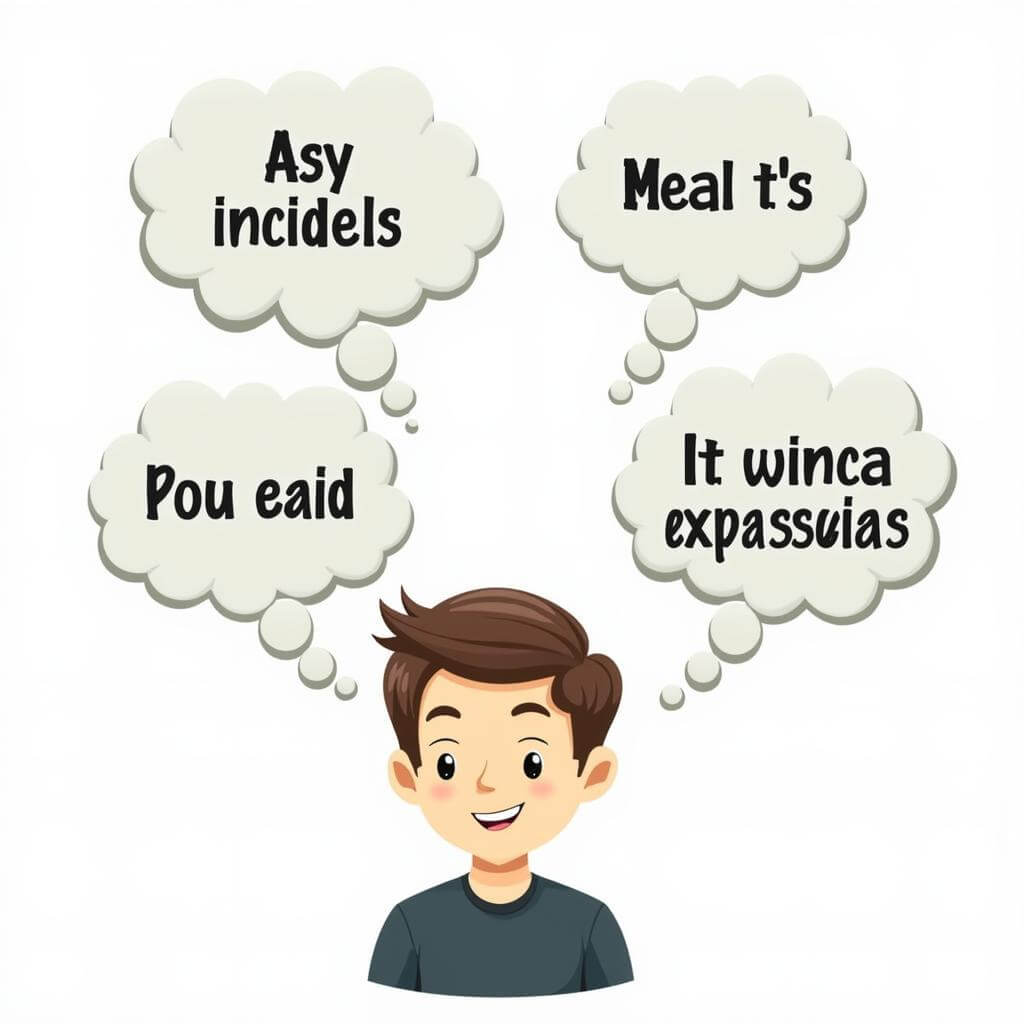Incorporating idiomatic expressions in your IELTS Speaking test can significantly boost your fluency and impress the examiner. This guide will explore how to effectively use idiomatic language to enhance your performance and achieve a higher band score.
Understanding Idiomatic Language in IELTS Speaking
Idiomatic language refers to phrases or expressions whose meaning cannot be deduced from the literal definitions of the words used. In the context of IELTS Speaking, using idioms appropriately demonstrates a high level of English proficiency and cultural awareness.
Why Idiomatic Language Matters in IELTS
Using idiomatic expressions can:
- Showcase your advanced vocabulary
- Demonstrate natural fluency
- Convey complex ideas succinctly
- Impress the examiner with your cultural knowledge
Dr. Emma Thompson, a renowned IELTS examiner, notes: “Candidates who skillfully incorporate idioms into their responses often score higher in the lexical resource and fluency criteria.”
Strategies for Incorporating Idioms in IELTS Speaking
1. Start with Common Idioms
Begin by mastering widely-used idioms that can be applied to various topics:
- “It’s a piece of cake” (very easy)
- “Break the ice” (start a conversation)
- “Hit the nail on the head” (be exactly right)
2. Practice Contextual Usage
It’s crucial to use idioms in the right context. Practice incorporating them into your responses for different IELTS Speaking topics.
For example, when discussing a challenging experience:
“Learning to drive was no walk in the park, but I persevered and eventually passed my test.”
3. Avoid Overuse
While idioms can enhance your speaking, overusing them can seem unnatural. Aim to use 1-2 idioms per speaking part, ensuring they fit naturally into your responses.
4. Understand the Meaning and Origin
Knowing the background of idioms can help you use them more confidently. For instance, “to break the ice” originates from ships breaking ice to clear a path in frozen waters.
Advanced Techniques for Idiomatic Language in IELTS Speaking
1. Adapt Idioms to Different Topics
Learn to modify idioms slightly to fit various subjects. For example:
- “The cherry on top” can become “the icing on the cake” when discussing achievements
- “To kill two birds with one stone” can be adapted to “to hit two targets with one arrow” for variety
2. Use Idioms to Express Opinions
Incorporate idiomatic expressions when giving your views:
- “In my book, environmental protection should be a top priority.”
- “If you ask me, the pros outweigh the cons when it comes to learning a second language.”

3. Combine Idioms with Topic-Specific Vocabulary
Blend idiomatic language with subject-related terms to demonstrate both fluency and topic knowledge:
“The government’s new environmental policy is a step in the right direction, but it’s just the tip of the iceberg when it comes to addressing climate change.”
Common Pitfalls to Avoid
- Misusing idioms: Ensure you understand the correct meaning and usage
- Forcing idioms into conversations unnaturally
- Using outdated or culturally insensitive expressions
- Relying too heavily on memorized phrases without context
IELTS expert Sarah Johnson advises: “It’s better to use a few well-chosen idioms confidently than to pepper your speech with expressions you’re unsure about.”
Practicing Idiomatic Language for IELTS Speaking
- Watch English-language movies and TV shows, noting down interesting expressions
- Read English newspapers and magazines to expose yourself to current idiomatic usage
- Practice with native speakers or language exchange partners
- Use idiom dictionaries and resources to expand your knowledge
How to avoid simple vocabulary in IELTS speaking is another crucial skill that complements the use of idiomatic language.
Incorporating Idioms in Different IELTS Speaking Parts
Part 1: Introduction and Interview
Use simple, common idioms to describe yourself and your experiences:
“I’m over the moon about starting my new job next month.”
Part 2: Long Turn
Incorporate idioms to make your description more vivid:
“The beach I’m describing is truly a hidden gem, off the beaten track.”
Part 3: Discussion
Employ more sophisticated idioms to express complex ideas:
“The issue of urban planning is a double-edged sword, with both advantages and drawbacks.”
Strategies for IELTS speaking part 3 discussion questions can help you integrate idioms more effectively in this challenging section.
Conclusion
Mastering idiomatic language in IELTS Speaking is a powerful way to elevate your performance and achieve a higher band score. By understanding, practicing, and appropriately using idiomatic expressions, you can demonstrate advanced language skills and cultural awareness. Remember to use idioms naturally and in context, and combine them with topic-specific vocabulary for maximum impact.
To further enhance your IELTS Speaking skills, consider developing fluency by practicing debates. This approach can help you become more comfortable using idiomatic language in various contexts.
FAQs
-
How many idioms should I use in the IELTS Speaking test?
Aim for 1-2 idioms per speaking part, ensuring they fit naturally into your responses. -
Can using idioms incorrectly lower my IELTS score?
Yes, misusing idioms can negatively impact your score. It’s better to use fewer idioms correctly than to use many incorrectly. -
Are there specific idioms I should avoid in IELTS Speaking?
Avoid outdated, overly complex, or culturally insensitive idioms. Stick to common, widely understood expressions. -
How can I practice using idioms for IELTS Speaking?
Watch English media, read widely, practice with native speakers, and use idiom dictionaries and resources. -
Should I explain the meaning of idioms I use in IELTS Speaking?
Generally, no. Using an idiom correctly in context should be sufficient. Explaining it may waste time and sound unnatural. -
Can I create my own idioms for IELTS Speaking?
It’s not recommended. Stick to established idioms to ensure the examiner understands your intended meaning.